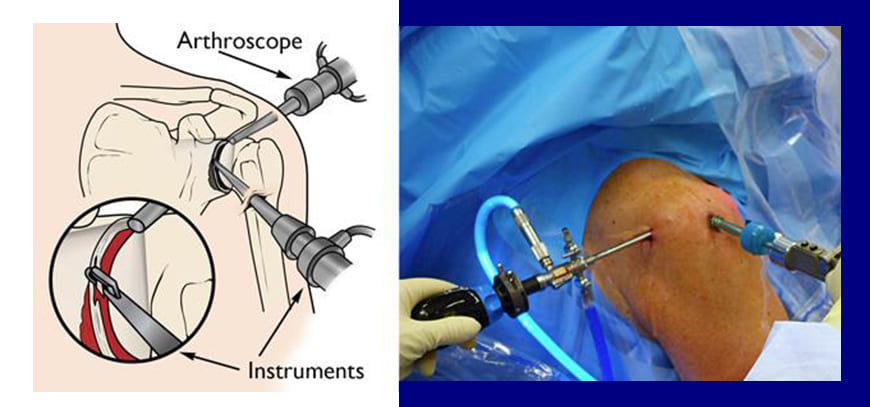Best Shoulder Arthroscopic Surgeons in Greater Noida
Dr. Abhisar Katiyar is recognized as one of the best shoulder arthroscopic surgeons in Greater Noida and a leading shoulder arthroscopy doctor in Greater Noida, specializing in minimally invasive shoulder procedures. Arthroscopy allows him to diagnose and treat conditions such as rotator cuff tears, shoulder impingement, and ligament injuries with precision and minimal downtime. With years of experience and advanced training, Dr. Katiyar provides personalized care that ensures faster recovery and long-term shoulder function. His patient-centered approach and commitment to using the latest arthroscopic techniques make him a trusted expert for shoulder surgery in Greater Noida.
Shoulder Arthroscopy is commonly performed for the following conditions:
- Repeated dislocations of Shoulder
- Rotator cuff tears Stiff or frozen shoulder
- Synovitis like rheumatoid arthritis, PVNS etc
- Impingement syndrome
- SLAP tears (Superior Labral Antero-Posterior tear)

Recurrent Shoulder Dislocations:
Most often, patients may have had a shoulder dislocated by a injury for which a relocation was done by a orthopedic Surgeon under anaesthesia.
This injury causes a tear of a ligament known as labrum in the shoulder. When this labrum fails to heal in correct position, repeated injuries, often with minor trauma and occasionally without any trauma, causes shoulder to repeatedly dislocate.
This can be diagnosed by clinical examination and confirmed by MRI Scan of the Shoulder.
Generally, such patients require a Arthroscopic Bankart's Repair Surgery and can get back to active life and sports after Surgery.
Rotator cuff tears:
Rotator cuff are a group of 4 muscles which hold the shoulder in its correct position and help in various movements of shoulder especially in overhead arm raising. The 4 muscles comprise of supraspinatus, infraspinatus, subscapularis and teres minor.
A tear in rotator cuff muscle may follow a injury of may occasionally be seen without any injury to the shoulder.
A tear in these cuff muscles lead to difficulty to raise arm over the head and pain in the shoulder.
The tear may a partial or a complete thickness tear for which treatments may vary accordingly.
If Conservative Methods fail, these tears are generally repaired by arthroscopic surgery with good results. Patients may need to do supervised physiotherapy after surgery to regain good movements.

Stiff or a "Frozen" shoulder:
A frozen shoulder is one in which patients may experience pain and stiffness of the shoulder. The pain may later decrease but stiffness often remains persistant. Exact cause of this is unknown. It is associated with inflammation (swelling) of the shoulder
joint capsule causing pain which leads to adhesions in and around the joint and contracture of the capsule which actually causes restriction of movements.
This may occur spontaneously or following a trivial injury to the shoulder.Patients who are above 40 years of age are prone to this and is more common in patients with diabetes.
Initial treatment includes medicines, physiotherapy sessions and occasionally injection in the shoulder.
Arthroscopic surgery may be needed in whom the above treatment strategy fails.

SLAP tears:
SLAP tear or superior labral anterior to posterior tears are an avulsion or a pulling off of the biceps attachment from the top of the glenoid socket along with the superior glenoid labrum.
These tears may also be accompanied by tendinitis or a tear of the biceps tendon.
These tears generally occur either due to a fall on an outstretched hand, repetitive overhead action as in a throwing athlete or lifting of a heavy weight.
If conservative treatment like rest and physiotherapy fails to improve the condition, then an arthroscopic surgery may be necessary to repair the tear.

 +91-8470937580
+91-8470937580